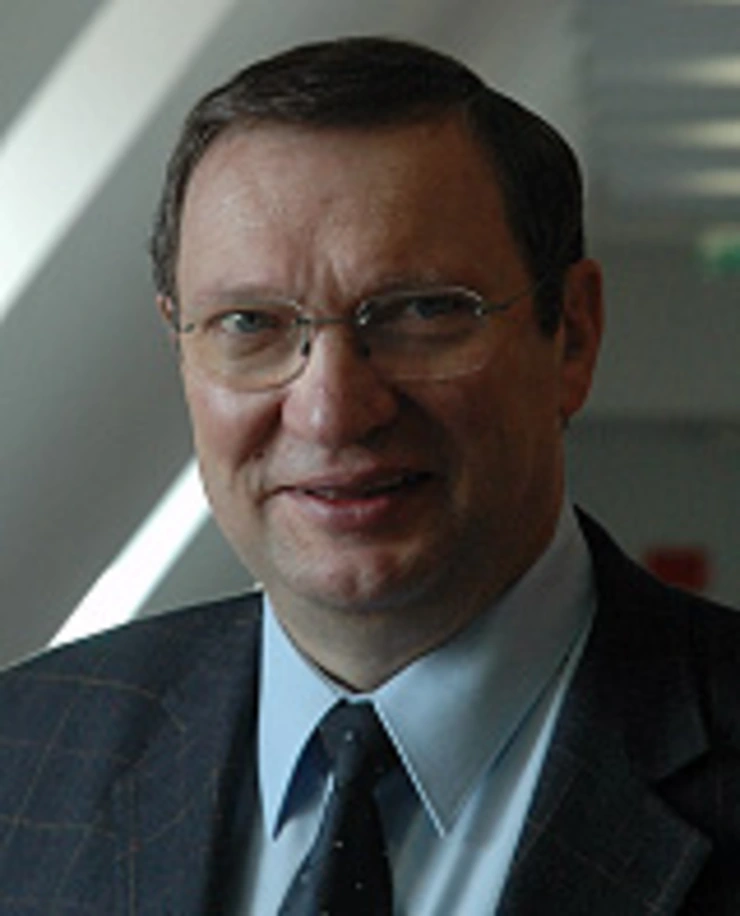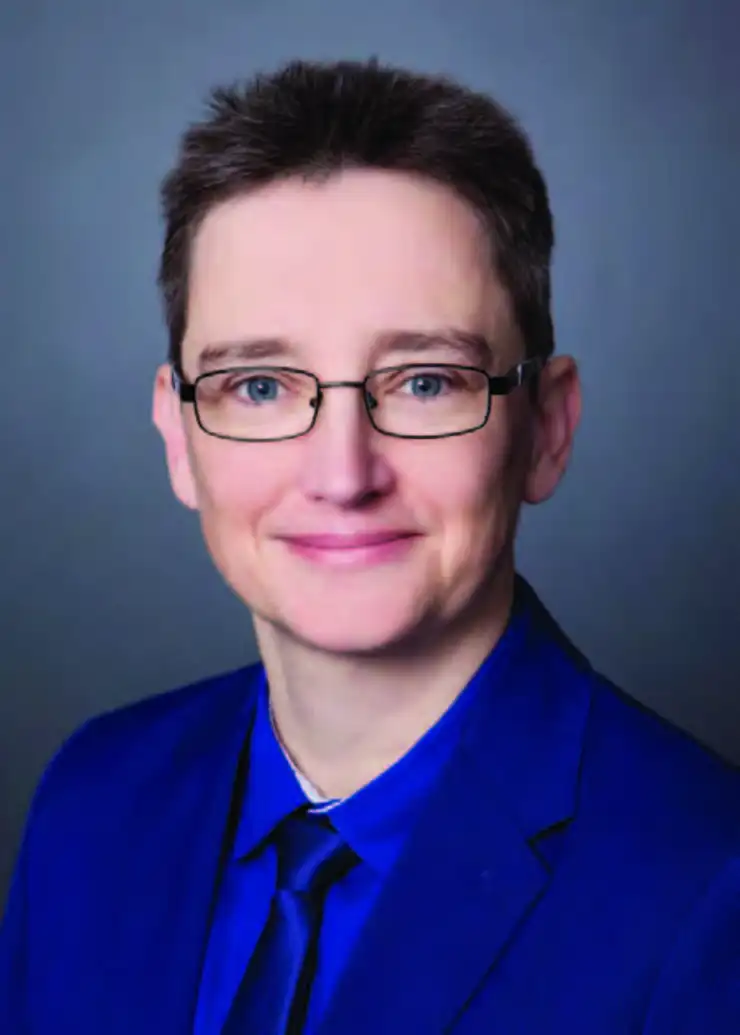Wolfgang Trilling was born in Chemnitz in 1925. He entered the oratory of St. Philipp Neri in Leipzig in 1949 and was ordained priest in 1952. After receiving his doctorate in 1958, he lectured on Old Testament Studies at the Philosophisch-Theologischen Studium Erfurt from 1959 to 1961. From 1961 to 1967 he was pastor of the Catholic Student Community (KSG) in Leipzig. During this time he was involved in the preparation and implementation of the first post-conciliar Meissen diocesan synod and helped to found the "Ecumenical-Theological Working Group in the GDR". From 1968 to 1970 he held a lectureship for New Testament Studies at the Philosophical-Theological Studies Erfurt. Subsequently, until 1985, he was an ecumenical guest lecturer at the Leipzig Theological Seminary, the largest of the three Protestant church universities in the GDR. It was not until his retirement that he was awarded the title of professor in 1991. Wolfgang Trilling died in Leipzig in 1993.
Wolfgang Trilling's main areas of research were the Gospels, the reception of Paul, hermeneutical and other interdisciplinary topics. He received honorary doctorates from the Westphalian Wilhelm University of Münster (1971) and the University of Graz (1986).
Important research work and publications (in selection)
Christusgeheimnis – Glaubensgeheimnis. Eine Einführung in das Markusevangelium (Die Botschaft Gottes 2), Leipzig 1957 [1959].
Das wahre Israel. Studien zur Theologie des Matthäus-Evangeliums (Erfurter theologische Studien 7), Leipzig 1959 [1962, 1964; 1975; eingereicht als Dissertation unter dem Titel „Die Theologie des Matthäus-Evangeliums“ 1958].
Hausordnung Gottes. Eine Auslegung von Matthäus 18 (Die Welt der Bibel 10), Düsseldorf 1960.
Im Anfang schuf Gott. Eine Einführung in den Schöpfungsbericht der Bibel, Leipzig 1963 [1964; 1967; Freiburg im Breisgau u.a. 1965].
Denn Staub bist du. Eine Einführung in den Bericht vom Paradies und Sündenfall, Leipzig 1964 [1967; Freiburg im Breisgau u.a. 1965].
Fragen zur Geschichtlichkeit Jesu, Düsseldorf 1966 / Leipzig 1966 [1967; 1969].
Vielfalt und Einheit im Neuen Testament. Zur Exegese und Verkündigung des Neuen Testaments (Unterweisen und verkünden 3), Einsiedeln u.a. 1968.
Christusverkündigung in den synoptischen Evangelien. Beispiele gattungsgemäßer Auslegung, Leipzig 1968 [München 1969 (Biblische Handbibliothek 4)].
Die Schrift allein. Moderne Exegese und reformatorisches Auslegungsprinzip (Zur biblischen Hermeneutik), Stuttgart 1970.
Untersuchungen zum zweiten Thessalonicherbrief (Erfurter theologische Studien 27), Leipzig 1972.
Was haltet Ihr von Jesus? Beiträge zum Gespräch über Jesus von Nazaret, Leipzig 1975.
Die Botschaft Jesu. Exegetische Orientierungen, Freiburg im Breisgau u.a. 1978.
Der zweite Brief an die Thessalonicher (Evangelisch-Katholischer Kommentar zum Neuen Testament 14), Zürich u.a. 1980 [Leipzig 1987].
Mit Paulus im Gespräch. Das Lebenswerk des großen Völkerapostels – eine Hinführung, Graz 1983 (Leipzig 1988; 1999).
Studien zur Jesusüberlieferung (Stuttgarter biblische Aufsatzbände 1), Stuttgart 1988.
Joachim Wanke was born in Breslau in 1941. His family came to Ilmenau in Thuringia during the expulsion from Silesia. After studying theology at the Erfurt seminary, he was ordained a priest in 1966. Afterwards he was chaplain in Dingelstädt in Eichsfeld. This was followed by his doctorate and habilitation in Erfurt. During this time he worked at the Erfurt seminary as assistant and prefect. In 1974 he received a teaching assignment for New Testament exegesis at the Philosophical-Theological Studies Erfurt and in 1980 he was appointed full professor for New Testament exegesis at the Erfurt seminary.
In the same year Pope John Paul II appointed him auxiliary bishop in Erfurt and co-adjutor of the Apostolic Administrator Hugo Aufderbeck in the Episcopal Office Erfurt-Meiningen. After the death of Hugo Aufderbeck he took over the office of Apostolic Administrator of the Episcopal Office Erfurt-Meiningen in 1981. In 1994 Joachim Wanke was appointed by Pope John Paul II as bishop of the newly established diocese of Erfurt. From 1998 to 2010 Joachim Wanke was chairman of the pastoral commission of the German Bishops' Conference. From 2008 to 2016 he was also chairman of the governing body for the revision of the Unified Translation of Sacred Scripture. For health reasons he resigned as Bishop of Erfurt in 2012.
As a bishop in the GDR, but also in reunited Germany, Joachim Wanke moved the question of how the Gospel can be proclaimed in a non-Christian environment and how Christians can be welcoming and informative.
Important research work and publications (selection)
Die Emmauserzählung. Eine redaktionsgeschichtliche Untersuchung zu LK 24,13–35 (Erfurter theologische Studien 31), Leipzig 1973.
Beobachtungen zum Eucharistieverständnis des Lukas auf Grund der lukanischen Mahlberichte (Erfurter theologische Schriften 8), Leipzig 1973.
„Bezugs- und Kommentarworte“ in den synoptischen Evangelien. Beobachtungen zur Interpretationsgeschichte der Herrenworte in der vorevangelischen Überlieferung (Erfurter theologische Studien 44), Leipzig 1981.
Die Frohbotschaft der Weihnacht, Freiburg im Breisgau u.a. 1988.
Deine Auferstehung preisen wir. Österlich leben, Freiburg im Breisgau u.a. 1990.
Last und Chance des Christseins. Akzente eines Weges (Vorträge, Hirtenbriefe und Predigten 1980–1990; zum 10. Bischofs- und 25. Priesterjubiläum), Leipzig 1991.
Neue Herausforderungen – bleibende Aufgaben. Beiträge zur Pastoral in postsozialistischer Zeit, Leipzig 1995.
Lasst uns das Licht auf den Leuchter stellen. Impulse für Christen, Leipzig 2001 [1. und 2. Aufl.].

Claus-Peter März was born in Leipzig in 1947. He studied Catholic theology in Erfurt and Neuzelle and received the sacrament of priestly ordination in Dresden in 1971. Afterwards he was chaplain in Meissen and Leipzig. After obtaining his licentiate, he was a research assistant at the Erfurt Philosophical-Theological University from 1974 and received his doctorate in 1978. From 1979 he was lecturer and from 1981 administrator of the Chair of New Testament Studies in Erfurt. After an academic year in Rome in 1988/89 he became full professor for New Testament Studies at the Philosophisch-Theologischen Studium Erfurt or the Philosophisch-Theologische Hochschule Erfurt and from 2003 to 2012 at the newly established Catholic Theological Faculty of the University of Erfurt. In 1992/1993 he was visiting professor at the TU Dresden and in 1997 visiting professor at the academic year of Dormitio Abbey in Jerusalem. From 1990 to 1992 he held the office of Rector of the Philosophical-Theological Studies and in 1992/93 the office of Prorector.
Claus-Peter März's main areas of research are Lucanian theology, the history of the Passion, the reconstruction and theology of the Logienquelle Q and the Letter to the Hebrews.
In the field of the new sacred song März became known as a text author through his collaboration with the church musician Kurt Grahl. One of the most famous works is the song Wenn das Brot, das wir teilen, which reminds of the "Rose Miracle" of Elizabeth of Thuringia. He created the lyrics to the oratorios Aufstand der Worte and Große Johannespassion.
Claus-Peter März was a member of various commissions and advisory boards, among them: Advisor to the Commission "Science and Art" of the German Bishops' Conference (1990-1993), Scientific Advisory Council of the Catholic Biblical Association (1990-2000) and its 2nd Chairman (1996-97), University Structure Commission of the State of Thuringia (1991-1992), German Ecumenical Study Committee (1993-2002), Scientific Advisory Council "Theology in Distance Learning" (from 1995), Advisor to the Faith Commission of the German Bishops' Conference (from 1997).
Important research work and publications (selection)
Das Wort Gottes bei Lukas. Die lukanische Worttheologie als Frage an die neuere Lukasforschung (Erfurter theologische Schriften 11), Leipzig 1974.
„Siehe, dein König kommt zu Dir …“. Eine traditionsgeschichtliche Untersuchung zur Einzugsperikope (Erfurter theologische Studien 43), Leipzig 1980 [1981].
Hebräerbrief (Die neue Echter-Bibel. Kommentar zum Neuen Testament mit der Einheitsübersetzung 16), Würzburg 1989 [2. Aufl. 1990].
„… lasst eure Lampen brennen!“. Studien zur Q-Vorlage von Lk 12,35 – 14,24 (Erfurter theologische Schriften 20), Leipzig 1991.
Hoffnung auf Leben. Die biblische Botschaft von der Auferstehung (Begegnung mit der Bibel), Stuttgart 1995.
Studien zum Hebräerbrief (Stuttgarter biblische Aufsatzbände 39), Stuttgart 2005.
Jesus. Sein Weg, seine Botschaft, seine Zeit, Leipzig 2007 [2012].
Paulus. Sein Leben, sein Wirken, seine Zeit, Leipzig 2008.
Petrus. Sein Leben, sein Wirken, seine Zeit, Leipzig 2010.
Studies
10/2011 – 09/2017 Catholic Theology and Latin Studies for teaching at secondary schools at the Catholic University Eichstätt/Ingolstadt with semesters abroad in Jerusalem ( 41. Theologisches Studienjahr 2014/15) and Vienna (2016)
Graduations: Dual Subject Bachelor of Arts applicable as teacher training course for middle school/grammar school (11/2016), First State Examination (09/2017), Interdisciplinary Master of Arts suitable for Teacher Training (03/2018)
Topic of the Master Thesis: „Jesus as an Epic Hero? A Comparison of Virgil’s Aeneas and Juvencus’s Jesus Based on a Narratological Examination of Selected Scenes“
School Education
09/2002-04/2011 Maristengymnasium Fürstenzell (Grammar School), Graduation: Abitur
09/1999 – 07/2002 Primary School Jägerwirth
09/1998 – 07/1999 Primary School „Francis-of-Assisi“, Augsburg
Work experience (selection)
Since 07/2020 academic assistant at the Chair of Exegesis and Theology of the New Testament
Since 02/2020 teacher for the Office of Education of Central Thuringia
02/2018-02/2020 Preparatory Service for teaching at secondary schools in Bavaria, Graduation: Second State Examination
01/2013-01/2017 (with interruptions) Student assistant at the Chair of Classical Philology and reception of Antiquity at the Catholic University Eichstätt/Ingolstadt
05/2011-09/2011 Volunteer Service at the Comunauté de Taizé, France

Born in 1967 in Altenburg/Thuringia, initially training and professional activity as a physics laboratory assistant, the change in 1989 made a change of profession necessary. After working as a physiotherapist for several years, in 2004 she changed her profession to theology.
This began with the employment as a staff member in the "Orientation - Contact Point of the Catholic Church for Questions of Life and Faith" in Leipzig (04/2004 - 09/2006).
This was followed by the study of Catholic theology at the University of Erfurt from 2006 - 2012. The topic of the diploma thesis was: "The Phenomenon of Religious Indifference as Challenge and the Thought of Representation as Possible Answer". In it, Grace Davie and her idea of a vicarious religion was especially mentioned.
During her studies (10/2006 - 03/2012) student assistant at the Department of Philosophy of the Catholic Theological Faculty in Erfurt. After her studies, first employed as coordinator at the Theological Research College at the University of Erfurt, then from 2014 to 2018 as research assistant in the DFG project "Funeral and Commemoration Celebrations after Major Disasters in Secular Society with Church Participation. A Liturgical Study." Within this time for 10 months research assistant at the Chair of Liturgical Studies.
In WS 2018/19 and SS 2019 teaching assignments each for a tutorial on philosophy in theology at the Catholic Theological Faculty of the University of Erfurt.
11/2019–01/2022: research assistant at the Department of Exegesis and Theology of the New Testament, here especially in the project "Vetus Latina and Beginnings of the Latin Bible".
Articles in anthologies:
Eine Stadt trauert. Zum Umgang mit einem Schulamoklauf in Erfurt, in: Benz, Brigitte / Kranemann, Benedikt (Hgg.), Deutschland trauert. Trauerfeiern nach Großkatastrophen als gesellschaftliche Herausforderung, Würzburg 2019, S. 39 – 46.
Gottesdienste als Beitrag zur Bewältigung einer Naturkatastrophe - Einige Überlegungen aus liturgiewissenschaftlicher Perspektive, in: Schwillus, Harald / Moser, Hans (Hgg.), Land unter - Der Mensch vor der Katastrophe. Menschliche Wahrnehmung singulärer hydrologischer Ereignisse (Bericht Nr. TT-23 der KHR Report No TT-23 of the CHR © 2017, KHR/CHR), S. 19-27.
Eine ökumenische Trauerfeier mit Konfessionslosen angesichts einer Katastrophe. Das Gedenken an die Toten des Amoklaufs in Erfurt im Jahre 2002, in: Kranemann, Benedikt / Benz, Brigitte (Hgg.), Trauerfeiern nach Großkatastrophen. Theologische und sozialwissenschaftliche Zugänge, Würzburg 2016, S. 9 - 20.
Journal articles:
Kirchliche Handlungsoptionen in heutiger Zeit – Profilierung, Anpassung und/oder Stellvertretung? (Titel im Inhaltsverzeichnis: Kirchliche Handlungsoptionen von Profilierung über Anpassung bis Stellvertretung), in: euangel. magazin für missionarische pastoral 1 | 2018, Ekklesiologie(n).
Nach Katastrophen hilft öffentliche Trauer. Zentrale Trauerfeiern und die Aufgaben der Notfallseelsorge, in: Die Info 122 (2-2017), S. 24 - 28.
Benz, Brigitte / Kranemann, Benedikt, Öffentlich trauern. Was Disaster Rituals über Zeitgeist, Religionen und Weltanschauungen verraten, in: forschung 3/2016, S. 6 - 11.
Den inneren Reichtum entdecken. Räume der Stille - Oasen im Alltag, in: ÖkologiePolitik 122 (September 2004), S. 15.
Diploma thesis:
Das Phänomen der religiösen Indifferenz als Herausforderung und der Stellvertretungsgedanke als mögliche Antwort, GRIN Verlag, 2013.